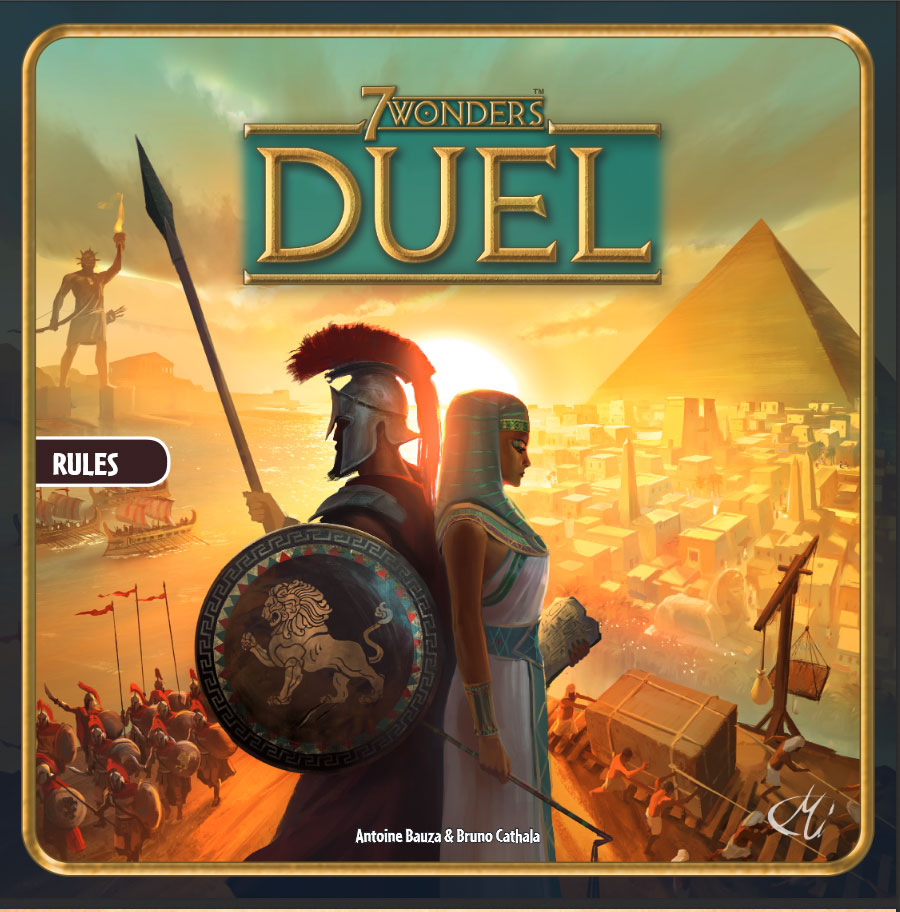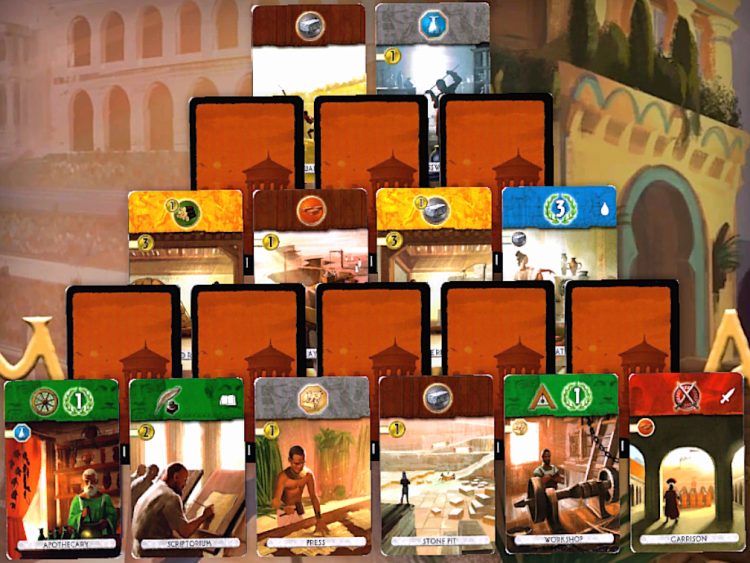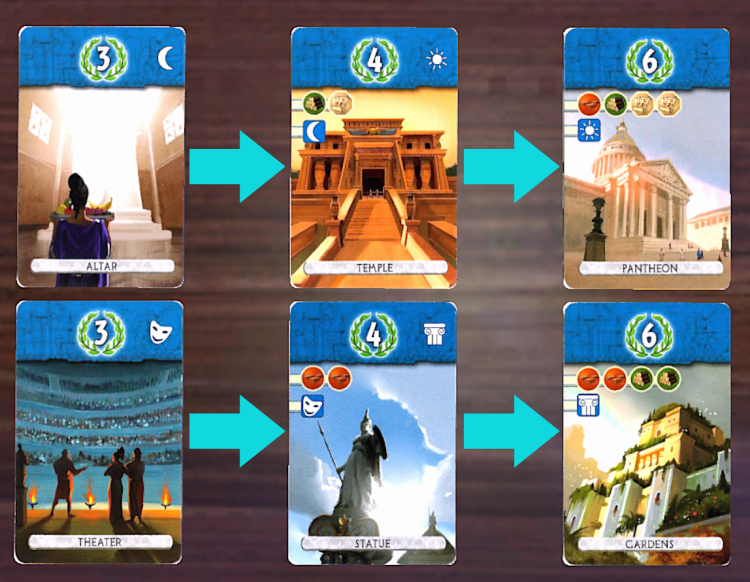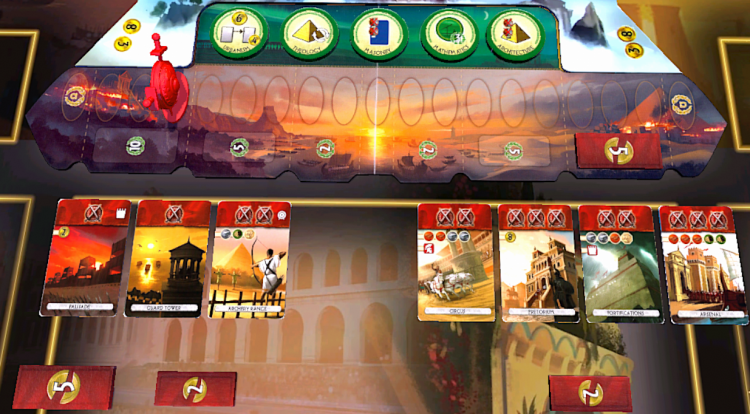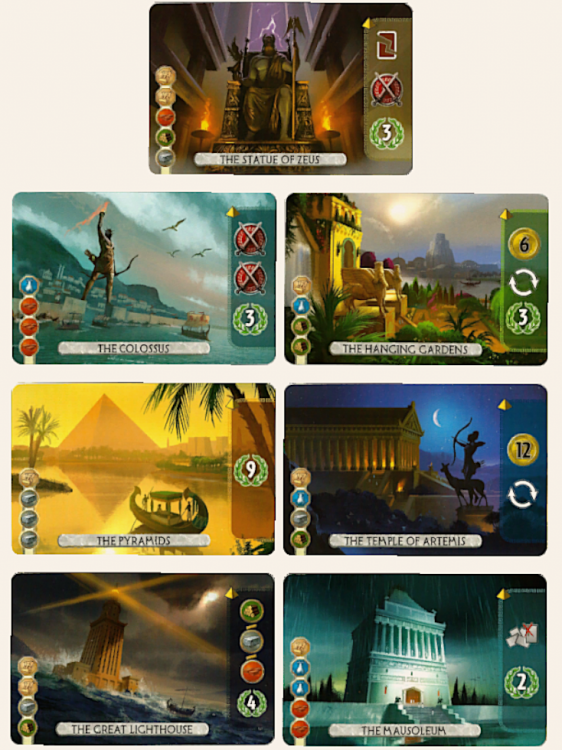In my boardgame groups, there’s something we like to jokingly call a ‘conversion rate’: namely the frequency and speed in which a game gets purchased by a player, for themselves, after a friend shows it to them. With the exception of 2 people, one of whom lives 10 minutes from my house, and one of whom is Wings, literally every person who I have shown 7 Wonders Duel to has bought it.
So, what makes this game so damn good? A spinoff of the extremely popular 7 Wonders, this game shrinks the number of players down to 2 (obviously) and streamlines the entire gameplay experience. Players take command of a city that begins with nothing but 4 Ancient Wonders of the World that are ‘under construction’. These range from the eponymous Seven such as the Pyramids, the Statue of Zeus, and the Pharos at Alexandria, to other famous buildings and great works like the Piraeus, the Great Library and the Sphinx. I’ll get into what these do later on, but for now I’ll just say their effects are major.
The game begins with the cards from the First Age set up as pictured. During a turn, players take a card from the tableau and can choose to build it, paying the cost in materials and/or gold, sell the card for gold, or use the card to build a wonder. However, players can only take cards that are completely uncovered; if a face down card is completely uncovered, it’s flipped face up.
Naturally, since half the cards are unrevealed at the start of the game, and a certain amount are removed from the pool in each age, a player can’t just autopilot their way through the game. Things will change as more and more cards are revealed. You might be gunning for a certain wonder and you have a lot of Clay cards to help you along, but then the Clay Reserve gets revealed and you have a choice between getting your wonder done asap (or access to another good card) or making it so your opponent has to constantly pay a lot of money for clay. The three options available for a card means that you can ALWAYS deny a card to an opponent (by selling it), but it’s much more tricky to take that card for yourself.
Building a card puts that building in your city, which gives you benefits like resources (clay, wood and glass) which you need to build things, money, victory points, military might and science. All of the cards are colour coded which lets you know at a glance what they’re for (Brown and Grey are resources, Yellow is economy etc etc) which makes them extremely easy to read. The cost of the card is written on it, and it will cost resources and/or gold. If you have the resources you need, you’re good, otherwise you have to pay for them, and each copy costs 2 gold plus however much of that resource your opponent is making. Thankfully though, they don’t get the money.
Once the tableau has been worked through, the cards from the Second Age are set up and play begins again. The main difference in this age (and the successive one) is that some cards have a cost that’s a strange symbol. This cost basically means that if you have the building indicated by that symbol, you can ‘upgrade’ it and build this building for free. For example, possession of a Temple, which has the Sun Symbol, allows you to build the Pantheon for free, which costs a Sun Symbol (or a lot of resources).
Once the Second Age is done, the Third Age begins. Building effects are further amplified and Guilds are also introduced, which give players Victory Points and/or Gold based on the number of buildings of a certain type there are in the city with the most of them.Once all the cards have been removed, players tally up all the victory points on the cards in their city and the player with the most wins.
That is, if someone hasn’t won in another way beforehand.
7 Wonders Duel has three ways to win. One is the ‘time’ victory that I’ve just outlined. However, much like in games such as Civilization, a player doesn’t just win by having the nicest city. They can also win by taking over someone else’s nice city, through military strength. Each shield icon they accrue on a building they build moves a tracker towards the opposing player. When it hits certain points, the opposing player loses gold and will give the other player victory points. If it hits a point where one player has 9 more military than the other player, the game instantly ends and that player wins.
The second way to win instantly is via science. There are a set of 12 green building cards that have 2 copies of 6 different symbols on them. If a player gets a matching pair, they can take a scientific advancement token from the play board. These are randomly picked at the start of the game and they have major effects. These include but are not limited to:
Getting discounted wonders,
Getting money for upgrading buildings,
Stronger military buildings
Extra turns after building wonders(!)
…and so on.
These are a nice reward for getting a pair of symbols, but if you manage to get 6 different symbols, you instantly win the game through a science victory.
While these seem drastic, it allows a player to go for an alternate way of winning, especially if they think they’ve fallen behind on city construction. It also prevents the game from being a stale, luck-based build off. This hits hard when you realize that the Third Age has as much military as the First and Second Ages combined. A Third Age based Military Victory can arrive distressingly quickly; at the very least you can force your opponent to react by building their own military, lowering their total victory points and distracting them. On the flip side, Science is pretty equally spread out among all the Ages, so you won’t be winning with that unless you’ve been focusing on that for most of the game. It does mean any win you do get will be absolutely crushing.
Finally, we come to the Wonders. At any point during a player’s turn, they can slot the card they’ve picked underneath a wonder and spend the cost of the wonder to build it. Each wonder costs roughly the same as a Third Age building but has effects that are quite simply bonkers. I’ll just go over a few of the more egregious and fun ones now:
- Piraeus/Great Lighthouse: You get some VP and a basic/advanced resource of your choice each turn, for free. The Piraeus also gives you an extra turn(!) immediately.
- Great Library: You know those really good Scientific Progress tokens? Pick 3 that were discarded and play/keep 1 of them.
- Statue of Zeus/Circus Maximus: Destroy(!) one of your opponent’s basic/advanced resources, move your military token up and get some VP.
- Mausoleum of Mausollos: Go through the building discard pile, pick one of them, build it for free.
There’s also what I term amplification wonders, which do things like give you a lot of VP, gold or military, which can easily nudge you over to a win. It’s also important to note that just under half the Wonders give you an extra turn, which allows a skilled player to chain together 3 or 4 Wonder builds consecutively, and if they manage to build all 4 Wonders, then the opposing player can only build 3 (since there can only be 7 Wonders!).
The main pros of the game are the flavour (something feels just viscerally nice about getting to build the Great Library, or a Praetorium, or an Observatory and using it to clown on someone), the sheer ease of play and as mentioned before, the different ways to win.
Despite it being an awesome game though, there are a couple of cons.
Firstly, because it’s a game based on the 7 Wonders of the Ancient World, it’s heavily centered around the Mediterranean (with Babylon being the furthest East and Egypt being the furthest South). With this in mind, I don’t mind that the extra wonders are mostly Greco-Roman and Egyptian, but then the promo cards being added being the Statue of Liberty and Essen Convention Centre really makes me wish they added some Wonders from further south in Africa (Stelae of Aksum), the Far East (The Great Wall) or Mesoamerica (Nazca Lines) – those would have been really cool and expanded the range.
The second issue with the game is more about gameplay, and it comes right near the end. Due to how the cards are laid out, the last 8 or so turns of the game become this slightly awkward and desperate thing where if someone is close to a military win, they’re praying that one of the cards that gets flipped over is a military card they can use to win. Of course, if the card is already face up, then both players can easily math out if said player can pick up the card or not, which sometimes leads to a slightly underwhelming and ‘inevitable’ end to a rather fun game up to that point.
Despite these two issues though, I’d already highly recommend this game to anyone that’s even the slightest bit interested in games set in the ancient world, soft citybuilders, or just…good games in general, and that’s without getting into the expansion…
Pantheon
As of right now, 7 Wonders Duel has a single expansion, named Pantheon. Pantheon adds a single new mechanic to the game, but it goes in extremely hard on it. You’re now able to play around with divinities from Mediterranean pantheons, and their effects are significant. Despite this though, they slot as easily into the core gameplay as the new materials slot into the current gameboard. The only ‘loss’ is the aforementioned Third Age guilds, which give way to Grand Temples; there are three of these in a game, and you score VP for each one you have in your city, with the reward for all three being sizable.
As for how the core gameplay changes, the First Age is mostly unchanged, with the players getting the chance to pick which gods will be in the Pantheon for that game. There are 15 gods total, with 5 different cultures having 3 gods each. Roman gods focus mostly on military, Egyptian gods focus on wonders, Phoenician gods focus on economy, Mesopotamian gods focus on science, and Greek gods are a general grab bag. As well as the specific gods, players choose their position on the pantheon, which determines how much they pay for them. This runs on a sliding scale; gods closer to one player are cheaper for that player and more expensive for the other, meaning the positions are key, and there’s a fair bit of mindgaming you can get up to.
From the Second Age onwards, players can use an action to purchase a god instead of drawing a card. They then resolve the god’s effects, and these have a massive variation in effectiveness.
On the one hand, Astarte gives you a piggy bank with 7 coins inside, you get a victory point for each coin still in there at the end of the game. Meanwhile Aphrodite just gives you 9 victory points.
On the other hand, the Egyptian gods are just completely off the wall, Anubis lets you blow up(!) a wonder and rebuild it later, meaning you can build something like the Great Library, get a really good progress token, destroy the Great Library, rebuild it, and get another progress token. Or build two Circus Maximii and destroy two of your opponent’s resource cards. If that’s not crazy enough, Ra lets you just steal an opponent’s unconstructed wonder, giving you 5 total. Meanwhile Isis ‘just’ lets you build a wonder for free.
Naturally, it would be rather hard to perfectly balance 15 different grossly powerful cards, but they did manage to mitigate the damage by making them available to both players, and the backs of the cards are differentiated by which culture the gods are a part of, so you can just go “I’ll spend money on this unknown Egyptian God Card” and not have to worry you’ll end up with Aphrodite or something.
The Third Age remains relatively unchanged, with the sole difference being the removal of Guilds and the addition of Grand Temples, as mentioned earlier. Assuming all of the gods were purchased in the Second Age, you might still have the aforementioned problem of a game hitting an ‘inevitable’ result, but I suppose the developers didn’t want the Third Age to just go completely off the rails.
In conclusion, Pantheon is a good expansion, it doesn’t completely fix the two underlying issues with the base game and having to bring two boxes to a board game night is a bit of a hassle, but it seamlessly adds a really fun and powerful new mechanic to the game and it shakes things up, a lot.
